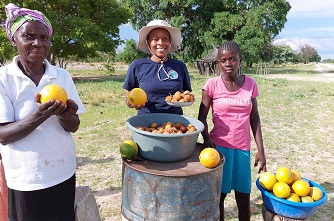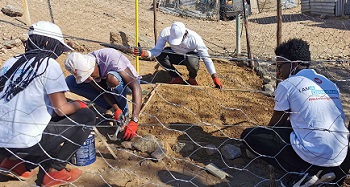
We are now seeing what it is like to have epidemic control – Shangula

For its 20th anniversary, the United States President’s Emergency Plan for AIDS Relief (PEPFAR) sent its Global AIDS Coordinator, Ambassador Dr John Nkengasong to Namibia to celebrate his organisation’s global achievements and its 18-year presence in Namibia.

PEPFAR Global AIDS Ambassador, Dr John Nkengasong paid a courtesy visit to the Deputy Prime Minister, the Right Honourable Netumbo Nandi-Ndaitwah to discuss health financing, HIV programming, and sustainability.
Dr Nkengasong arrived on Saturday 17 June, departing again earlier this week on the 20th. He met with government officials, health practitioners and civil organisations.

Dr Nkengasong hosted a PEPFAR 20th Anniversary celebration with local officials responsible for the PEPFAR programme in Namibia.
He congratulated Namibia on the remarkable progress on the Joint United Nations Programme for HIV/AIDS targets and ending HIV as a public health threat by 2030. In Namibia, 92% of the population know their HIV status, 99% of people living with HIV are on treatment, and 94% of those on treatment are virally suppressed, meaning the virus is not detectable in their bodies.
At the end of the official visit, Dr Nkengasong hosted a PEPFAR 20th Anniversary celebration where he announced the 2023 PEPFAR funding planned in consultation with the Namibian Government, civil organisations and multilateral partners. In 2023, Namibia will receive approximately N$1.6 billion from the US Government through PEPFAR.
Minister of Health and Social Services, Dr Kalumbi Shangula, said “Our partnership has grown stronger and more robust over the last two decades. Over the years, the partnership with PEPFAR has transitioned from an emergency to a long-term response. Many lives were saved, many people were given hope. We are now seeing what it looks like to have epidemic control.”

From the left, USAID Country Representative McDonald Homer; the Minister of Finance, Hon Iipumbu Shiimi; Global AIDS office representative, Irum Zaidi; PEPFAR Namibian Country Coordinator, Cheryl Amoroso; US Embassy Chargé d’Affaires, Jessica Long; Ambassador Dr John Nkengasong; Deputy Prime Minister, the Right Honourable Netumbo Nandi-Ndaitwah; the Minister of Education, Arts and Culture, Hon Anna Nghipondoka; the Minister of Gender Equality, Poverty Eradication and Social Welfare, Hon Doreen Sioka and the Minister of Sport, Youth and National Service, Hon Agnes Tjongarero.
PEPFAR is implemented in Namibia through the United States Agency for International Development (USAID), the US Centres for Disease Control and Prevention (CDC), and the Peace Corps.
Dr Nkengasong’s first stop was a Peace Corps supported programme, ‘Grassroots Soccer’ for young adults. At Katutura State Hospital, he met mothers living with HIV, their HIV-negative infants and their treatment supporters from the Prevention of Mother to Child Transmission programme which is led by the Ministry of Health and Social Services and supported by PEPFAR.
“This support has given me life,” one of the mothers told the AIDS Coordinator.

Grassroots Soccer coaches and the Office of the Global AIDS Coordinator team showed their footwork to Ambassador Nkengasong.
Reflecting on his time spent with the young people of Namibia, Dr Nkengasong said, “The HIV epidemic will only be ended by the engagement and leadership of the youth.”

Dr Nkengasong hosted a PEPFAR 20th Anniversary celebration with local officials responsible for the PEPFAR programme in Namibia.

From the left, PEPFAR Namibia Country Coordinator, Cheryl Amoroso; US Embassy Chargé d’Affaires, Jessica Long; Ambassador Dr John Nkengasong, the Minister of Health and Social Services, Hon Dr Kalumbi Shangula; the former Minister of Health and Social Services Dr Richard Nchabi Kamwi; the Executive Director in the Ministry of Health and Social Services, Ben Nangombe; and Sandie Tjaronda from Namibia Networks of AIDS Service Organisations.












































